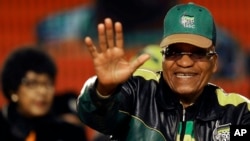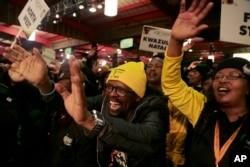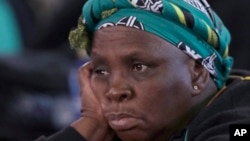South Africa's ruling African National Congress has opened a major policy conference, an event the party holds every five years to set priorities and programs ahead of the next elections.
But this year's meeting in Johannesburg is overshadowed by the major political drama haunting the long-dominant ANC, as an increasingly unpopular President Jacob Zuma faces a no-confidence vote in parliament.
The vote was sparked by Zuma's decision earlier this year to fire a well-respected finance minister and reshuffle his Cabinet. That political upheaval prompted a major ratings agency to downgrade the nation's sovereign credit rating, which has negatively impacted the economy.
Zuma's political troubles come as the country grapples with record unemployment — which stands at nearly 30 percent — and an economy in recession.
Calls for Zuma to resign have even come from prominent members of his own party, which has long prided itself for maintaining a unified front.
'We will never engage'
At the conference's opening on Friday, Zuma brushed aside the storm clouds over his head.
“Many of us have controlled ourselves not to respond to these comrades, because we know them,” he told the crowd of ANC representatives. “Some of them are not as strong as they project themselves,” he said, a comment that triggered laughter.
“We know them. But because we are keeping to the discipline of the organization, we are not engaging them in public, and we will never engage them,” he said.
This meeting precedes a major ANC political conference in December, at which point the party will choose a new leader to replace Zuma, whose term as president ends in 2019.
Next leader?
That new leader is likely to become South Africa's next president, and he or she would have the authority to pardon Zuma over the 783 counts of corruption he is currently facing. Already this battle has been painted by experts as a showdown between Zuma's favorite — his ex-wife, Nkosazana Dlamini-Zuma — and Zuma's increasingly critical and outspoken deputy president, Cyril Ramaphosa.
Political analyst Judith February says the thing to really watch this week is who comes out on top of the political heap.
“Essentially, this policy conference will be a proxy for the December leadership battle,” she told VOA. “And there will be horse-trading going on behind the scenes, there will be provinces, branches, trying to influence the process. And so, actually, I think policy will end up taking a backseat, and that this really is about the politics.”






